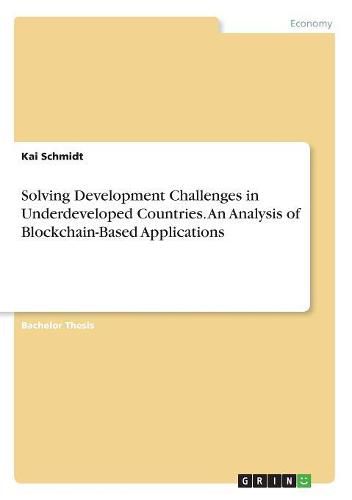Readings Newsletter
Become a Readings Member to make your shopping experience even easier.
Sign in or sign up for free!
You’re not far away from qualifying for FREE standard shipping within Australia
You’ve qualified for FREE standard shipping within Australia
The cart is loading…






Bachelor Thesis from the year 2017 in the subject Business economics - Business Ethics, Corporate Ethics, grade: 1,0, Frankfurt School of Finance & Management, language: English, abstract: In investigating the potential impact of the blockchain on underdeveloped countries, this study develops application ideas and analyses their impact, the feasibility of and impediments to their implementation and the expectations concerning their adoption. Blockchain technology can solve development problems as it improves existing instruments and enables the development of new ones. Blockchain-based applications particularly address institutional weaknesses and financial inclusion because they restrict deception, corruption and uncertainties. In the future, the blockchain can also be a development vehicle empowering people directly and mitigating power asymmetries. This study builds on existing development theories and contributes to poverty solution concepts. Researchers can expand on these results and review them in country-specific settings. Practitioners, predominantly governments and NGOs, should perceive the new opportunities of the blockchain and apply them to development obstacles.
$9.00 standard shipping within Australia
FREE standard shipping within Australia for orders over $100.00
Express & International shipping calculated at checkout
Bachelor Thesis from the year 2017 in the subject Business economics - Business Ethics, Corporate Ethics, grade: 1,0, Frankfurt School of Finance & Management, language: English, abstract: In investigating the potential impact of the blockchain on underdeveloped countries, this study develops application ideas and analyses their impact, the feasibility of and impediments to their implementation and the expectations concerning their adoption. Blockchain technology can solve development problems as it improves existing instruments and enables the development of new ones. Blockchain-based applications particularly address institutional weaknesses and financial inclusion because they restrict deception, corruption and uncertainties. In the future, the blockchain can also be a development vehicle empowering people directly and mitigating power asymmetries. This study builds on existing development theories and contributes to poverty solution concepts. Researchers can expand on these results and review them in country-specific settings. Practitioners, predominantly governments and NGOs, should perceive the new opportunities of the blockchain and apply them to development obstacles.